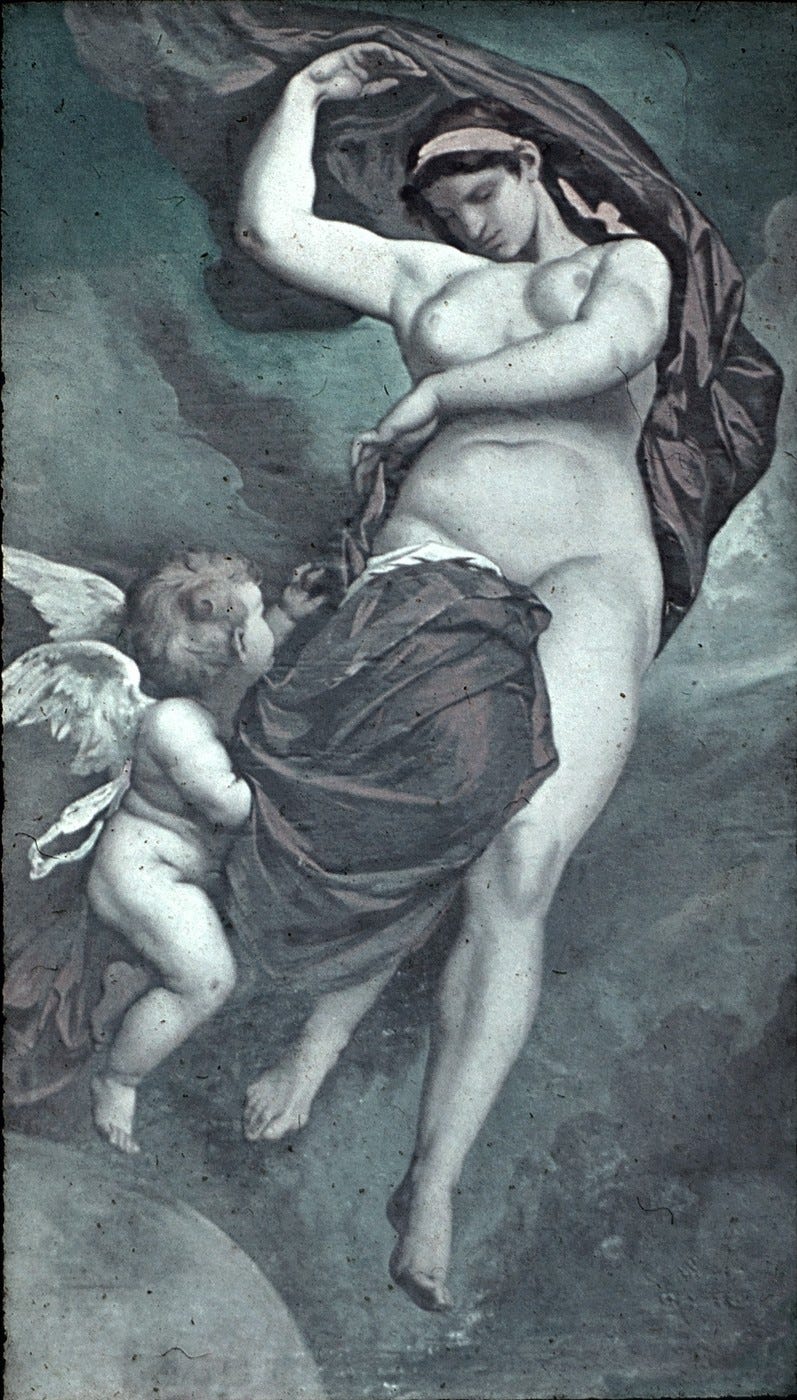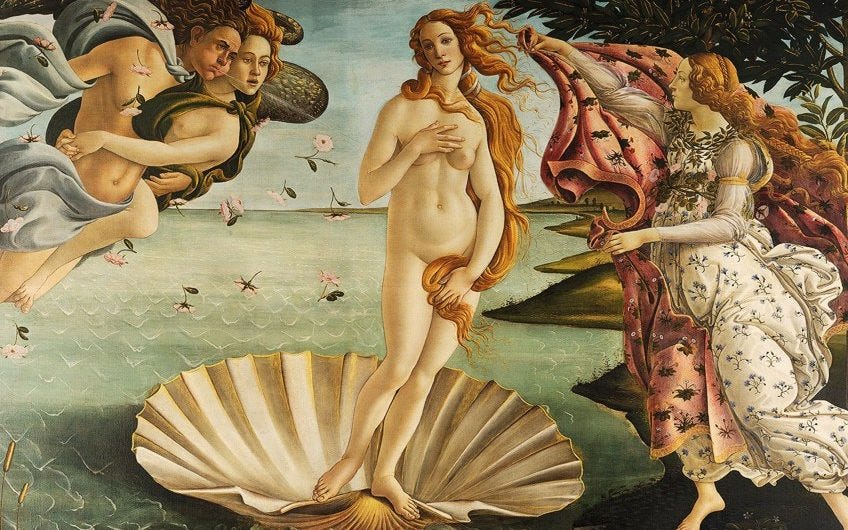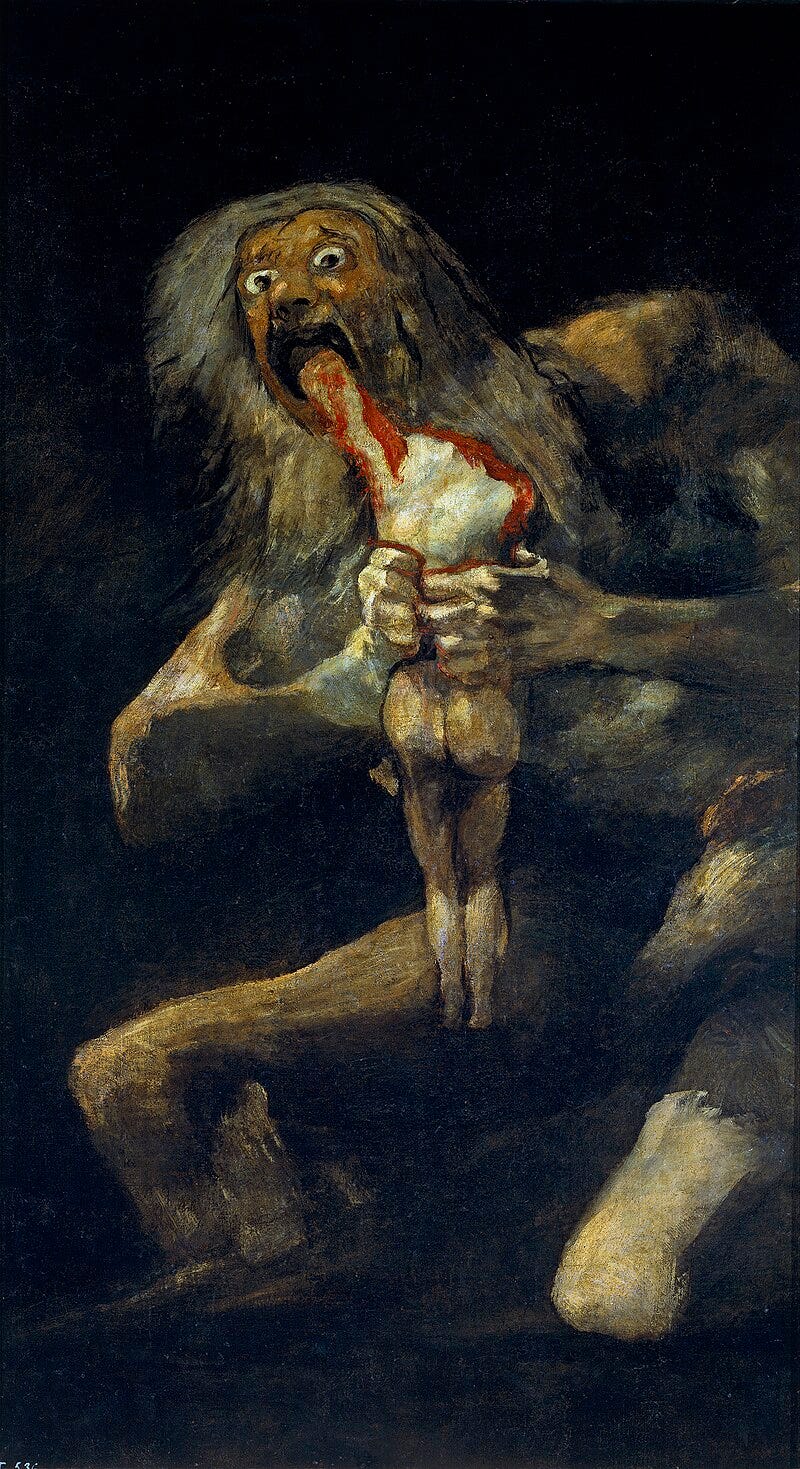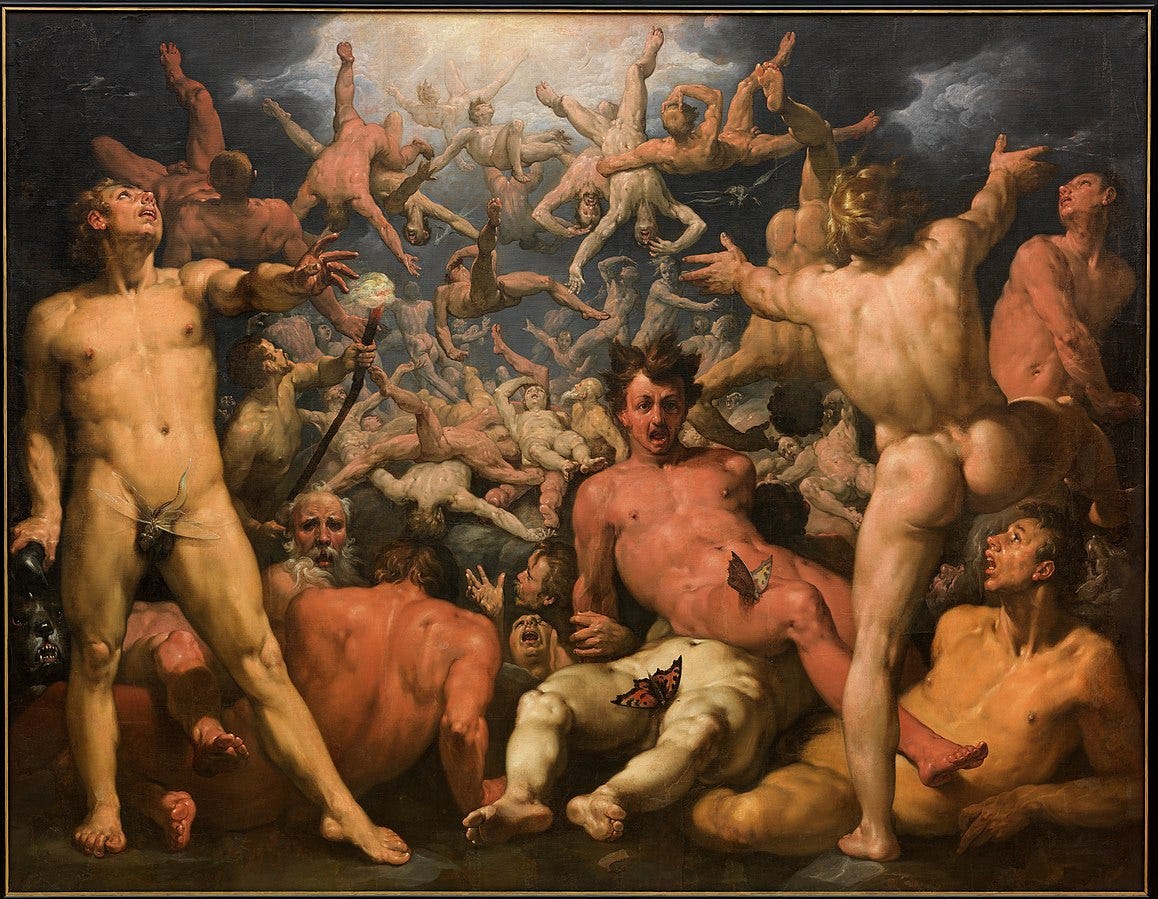Gods Vs Titans
...and the Origins of the Universe
Dear Classical Wisdom Reader,
By the time you read this, I’ll be off on a quick little mini-holiday this weekend. So I’m typing this up early and hoping nothing big happens in the world of Classics between now and Friday!
So for today’s article, we’re going back to the start, the VERY start, and asking…
What did the Greeks think about the beginning of things?
But first, if you’re interested in the interplay of mythology, history, and philosophy (and if you’re here, of course you are!), our next Roundtable Discussion will be on the Myth of Atlantis on August 9th at Noon EST.
Plato's Myth of Atlantis has captured the attention and imagination of people throughout the ages... We’ll read Plato’s original text on Atlantis, and try to get to the bottom (if we can) of the sunken city.
The discussion will be lead by Benjamin B. Olshin, former Professor of Philosophy, the History and Philosophy of Science and Technology, and Design at the University of the Arts in Philadelphia.
Members can register for that HERE.
Now, today we’re looking at nothing less than the origins of the universe in Greek mythology, and the war that soon erupted between between gods and titans.
It’s a thrilling story of patricide and creation, of monsters and myths.
Plus it makes for great holiday reading!
All the best,
Sean Kelly
Managing Editor
Classical Wisdom
Gods Vs Titans and the Origins of the Universe
by Van Bryan
The telling of the creation of existence and the rise of the gods is a tale that has survived through the writings of Hesiod, in his epic poem the Theogony. For the ancient Greeks this was their answer to the most fundamental question of existence. And as with all Greek mythology, the story of the creation of the world is shrouded in fantasy and wonder.
It was said that in the beginning of time there was chaos. Chaos existed without form or purpose. And from chaos there came Gaia, who was the earth, and who created all the land. She was the primordial being of the earth and she would give birth to the heavens, who was known as Uranus. Gaia and Uranus, who were the earth and the sky, became husband and wife and together had many children.
The earth, Gaia, gave birth first to the mighty Titans. These creatures were immortal and possessed great strength and power. As Hesiod describes it:
“she lay with Heaven and bare deep-swirling Oceanus, Coeus and Crius and Hyperion and Iapetus, Theia and Rhea, Themis and Mnemosyne and gold-crowned Phoebe and lovely Tethys. After them was born Cronos the wily, youngest and most terrible of her children, and he hated his lusty sire.” – Hesiod, from the Theogony
Gaia then gave birth to the Cyclopes, who were monstrous creatures with one bulging eye in the center of their foreheads. Then Gaia birthed the hideous Hecatonchires, who were creatures with broad shoulders, fifty heads, and one hundred arms. Uranus saw the Cyclopes and the Hecatonchires as vile creatures. With the birth of each, he would imprison them away beneath the earth. The imprisonment of her children saddened Gaia and she devised a plan to seek vengeance.
Gaia gathered her children, the mighty Titans, and told them of her plan to overthrow her husband, Uranus. In Hesiod’s own words, Gaia declares:
`My children, gotten of a sinful father, if you will obey me, we should punish the vile outrage of your father; for he first thought of doing shameful things.’
However the Titans were very afraid of their father; at first, none would volunteer to overthrow the ruler of the heavens. Then it was Cronus, the youngest of the Titans who hated his father Uranus, who stepped forward to do the deed. Gaia gave to the youngest titan a sickle and told him to lie in wait for his unsuspecting father.
While Cronus hid away from his father, Uranus was crossing the earth bringing the night. Uranus then appeared before Gaia, planning to lay with her, and it was then that Cronus struck. The young titan approached from behind and used the sickle to cut off the genitals of his father. He then flung them across the earth before they landed in the sea.
The blood from the detached member of Uranus mixed with the foam of the ocean. From the mist and the foam rose a beautiful figure. She was a goddess unmatched in beauty and grace, she stepped upon the land and the flowers and vegetation grew around her. She was Aphrodite, one of the original Olympians.
It was said that as Uranus lay bleeding upon the earth as Cronus stood over him. The blood spilled from the now deposed ruler of heaven and mixed with the earth, Gaia. Instantly several creatures were born from Gaia as her husband lay dying.
From this blood sprang the Giants, the Erinyes (the avenging Furies), the Meliae (the ash-tree nymphs). These creatures sprang from the blood of Uranus and then began to wander the earth.
Cronus was now the king of heaven. He had deposed his father and taken his place as ruler of the universe. However with the dying breath of Uranus, he prophesied a terrible fate for his traitorous son. Uranus predicted that one of Cronus’s children would overthrow him one day, just as he had overthrown his father. The prophecy would hang heavy on the head of the Titan.
After Cronus overthrew his father and former ruler of heaven, Uranus, he married his sister Rhea. Together they ruled over the universe and for a time, things were peaceful. However, the prophecy of Uranus deeply troubled Cronus. It had been predicted that a son of his would one day depose him and take his place as king.
The entire narrative was detailed by the poet Hesiod in his ancient poem, The Theogony. The poet describes how Rhea fears for her children, yet is in love with Cronus. Hesiod writes:
“But Rhea was subject in love to Cronos and bare splendid children”- Hesiod, from the Theogony
Rhea bore several children, Hestia, Demeter, Hera, Hades, and Poseidon, but Cronus feared that one of these children would be his downfall. And so, with each birth, Cronus captured the young infant and devoured the child to ensure that his reign as king was never opposed.
Rhea was terrified and deeply saddened to see her children mercilessly devoured by her husband. When it came time for Rhea to give birth to her youngest child, Zeus, she hid away to escape the wrath of her spouse. With the help of Gaia, the earth, she delivered her youngest child in a cave on the island of Crete, far from the eyes of her murderous partner.
The young Olympian Zeus was left on the island. His mother wrapped a stone in a blanket and presented it to Cronus. The titan devoured the substitute, believing it to be his son. Assured that the baby Zeus was no longer a threat, Cronus continued his rule, though unbeknownst to him, his youngest son was being raised in secret under the Aegean mountains. Some versions of the myth describe that the infant Zeus was raised on the island of Crete surrounded by armored dancers. These armored guardians would clap and sing whenever the baby would cry so that Cronus would not hear the screams and come to slay the infant god.
Zeus grew quickly, and when he came of age, he became determined to confront his father and take his place as ruler of the heavens. His grandmother, Gaia, gave him an emetic that would force Cronus to regurgitate the children he had devoured. Cronus bent over in agony and threw up all the children he had devoured. Poseidon, Hades, Hera, Hestia, and Demeter were brought to life again, now fully grown. In some versions it is told that Zeus cuts open his fathers stomach with a dagger and his siblings come pouring out.
It was at this point that a violent war waged for ten long years. On one side was the Olympians who were aided by the Cyclops, the Titans Prometheus and Epimetheus as well as the hundred armed Hecatonchires. They waged war against the original Titans and the Giants that had been born from the blood of Uranus.
The violent war was fought for ten years with no clear victor. Zeus and his allies took up a stronghold on mount Olympus where Zeus cast his thunderbolts upon his enemies. After much battling, the Olympians were victorious over the Titans. Zeus cast his father and the other Titans into the depths of Tartarus, the prison of the underworld. There they would remain for eternity, while their children ruled the universe.
The prophecy of Uranus had been fulfilled, the age of the Olympians had arrived.







The Ancient World is forever present; to read Hesiod is to read Freud, Jung, as well as other Moderns, and though we try to throw Freud out of our narratives of late, we cannot ignore the myths that are bases for the collective unconscious. Using such metaphors, we can see how wars continue. Is not Putin another Uranus or Cronus and are not the Ukrainians the Olympians, and the Olympians are not the most innocent beings as well. We are all encompassed with war in some way and it is brutal. Mostly, the war is within us. In a Hegelian sense, "war is purification." This for another time.
Pretty insane considering that this civilisation was at the forefront of mathematical and scientific discovery, yet it still entailed beliefs as far-fetched and implausible as this one about the creation of the universe, despite our intellect being up to par with theirs, probably inferior. We've come a long, long way.